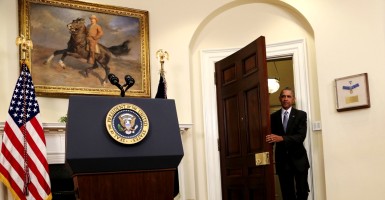In the military, it is well known that the most dangerous time on any operation or deployment is not at the beginning, when you are least experienced, but in the final time period, just before you complete your “tour of duty.”
This seems counterintuitive, but it is true. Scarily, this is also true for President Barack Obama’s final year in office.
As a unit or an individual rolls into the last part of a time overseas, or in combat, three phenomena occur. First, you recognize that you may not be able to get everything done that you planned to accomplish. This causes you to push harder to stuff things in, perhaps with negative results. Next, everyone starts to think about home, and the things that are ahead, after the finish line is crossed, even though they are still in the future.
That “daydreaming” can cause one to get sloppy, to forget to do some of the small things that have kept you alive up to that point. The results can be deadly. At the opposite end, the third effect is when one can become so fixated on getting done and out of there that risk aversion takes over.
In an effort to protect yourself from being the “last casualty,” you actually increase your chances of being hurt by no longer doing what was “working” all along. These three effects can often have catastrophic results. In the military, it is the job of the leader to ensure that this doesn’t happen. But what if the leader is the one affected?
This is the danger of Obama’s last year. He has already shown a propensity to force actions that he wants done as part of his “legacy,” at times using dubious constitutional actions to accomplish them. Opening Cuba, the nuclear deal with Iran, and the threat over immigration and gun rights are all examples of Obama’s overreach.
In his desire to bask in the glow he expects to feel as the “former president,” Obama has grown even more sanctimonious and preachy, ridiculing anyone who opposes his ideas or questions his motives.
His most recent State of the Union address was replete with sarcasm and dismissiveness toward any and all who took any view but complete acceptance of his point of view.
Lastly, his already weak foreign policy initiatives have grown ever more impotent.
He has left it to Secretary of State John Kerry, whose lack of anything approaching negotiating skills has allowed Iran, Russia, and China to run rings around America at every turn.
Obama has shown all the dangerous tendencies of a man in his last stretch of a difficult deployment.
Unfortunately for the United States, he is the leader who should be keeping everyone else from falling into these traps. When it is a president who is succumbing to these failings, who can protect America from the stumbles that are likely to occur? Particularly since Obama has little capacity to accurately gauge his own weakness and never wants to hear criticism from anyone of his sycophant subordinates.
Congress must step up. As the other operational branch of the government given us by the Constitution, they must play a bigger role. The president cannot be allowed to run roughshod over the interests of the American people based on his wishes, legacy, or fears. As the people’s representatives, Congress must act to rein in the dangerous propensities of Obama’s last year.





























